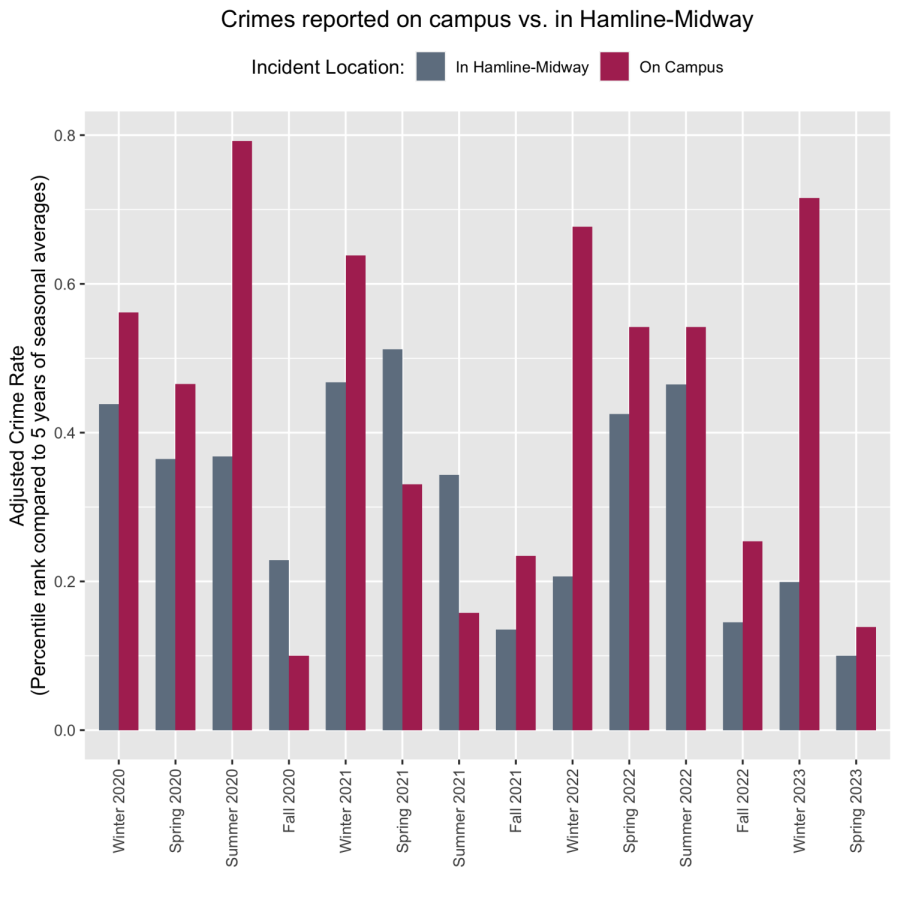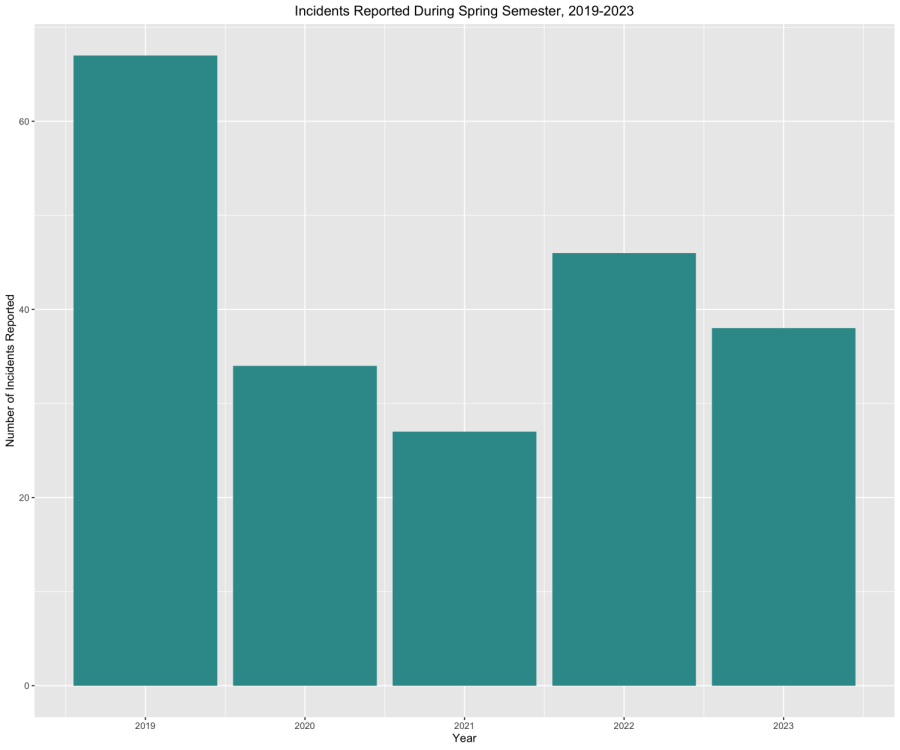Safety vs. policing on campus
Hamline has seen many new faces this spring semester, and some wear police uniforms. Their presence is not as new as first thought.
May 2, 2023
There has been an increase in police presence around campus since May of 2022. Hamline Public Safety (HPS) Director Illiana Cantu Delgado drove this initiative after noticing the rise in crime rates throughout the past years and during the beginning of her time at Hamline, starting January 2022.
A major factor to spark this decision was the overall increase in violence and crime around the nation, but specifically in high schools, colleges and universities.
“I have to make sure to the best of my ability that everyone is safe when they come here,” Cantu Delgado said. “I think that the perception might be that we see more police officers around, but in reality, it’s only one and it’s one that’s working directly for us.”
When they began, the officers were on an off-duty basis. The hours are scheduled and requested by Cantu Delgado. They are currently on a high-visibility patrol.
This partnership is not new. SPPD Public Information Officer Sergeant Mike Ernster, who has worked at SPPD for almost 29 years, describes Hamline as having “a great relationship with the SPPD” for the past 20 to 30 years.
“The [SPPD] communicates with and listens to what different people and organizations are dealing with in our community,” Ernster said. “Hamline University is a part of our community and we value their partnership in keeping our neighborhoods and city safe.”
Hamline students, faculty and staff have noticed their presence increasingly this spring.
The attention Hamline received during this semester from an international audience regarding the classroom incident that occurred during the fall semester sparked more presence.
Junior John-Luke Otis has noticed their increased presence as well.
“I kind of get a little nervous with them around a little bit and they’re just sitting there not doing anything. Who knows what they’re up to,” Otis said.
To have an officer on campus, Hamline pays SPPD $106 an hour, which is the rate all the colleges and private businesses of the surrounding area pay. This comes from money that was already built into the HPS operations budget for this purpose.
“Except for Metro State, each university in St. Paul has similar agreements with the police department,” Ernster said in an email. “Each one has their own priorities and their scheduling of officers is different in each location.”
These officers have contracted overtime through the SPPD. All of the people who work are vetted by the SPPD. Cantu Delgado asks for a roster of who would be working every month, and from there she speaks with each one about the plans and the Hamline campus. Cantu Delgado was a member of the SPPD and either knows or has met with every officer.
“Every single one that you see here, every single one I have vetted,” Cantu Delgado said.
HPS is currently not fully staffed. The best case scenario is three officers per shift, and HPS is currently not there. Hamline is not public property, but it is an open campus, so SPPD’s presence has added support.
Cantu Delgado explained that their presence has been beneficial as they have stopped crimes in progress from happening.
“It’s been a very proactive and profound approach to having more of a holistic view when it comes to safety and security here on campus,” Cantu Delgado said. “I don’t like to call it policing, because that’s not what they’re here for. We’re here to make sure everyone’s safe.”
Police presence has been a topic of conversation across the nation, especially after the murder of George Floyd at the hands of police officers.
“I heard from students concern when they saw a squad [car] in the Anderson ramp,” Cantu Delgado said regarding Hamline’s BIPOC student population. “I feel good that if you’re concerned that you can come to me and you’re getting answers from me. I am very transparent.”
She has talked to students of many identities about the increase in patrols and says she will continue to talk to anyone about this topic.
Throughout the course of reporting, students shared a perceived understanding that officers have been here to protect and make President Fayneese Miller comfortable. For two students, this idea spurred from the rescheduled MLK event where an officer and Cantu Delgado, who spoke at the event, were in Anderson Center, where the event was hosted.
“It was not solely for President Miller. It was for everybody attending the event, to make sure that the people who are there for the event were the ones in the building,” Cantu Delgado said. “We were just making sure that no unauthorized people were coming in.”
One sophomore, Jessa Schroetter, who is also an RA, said she does feel comfortable with their presence after interacting with one officer this year.
“They don’t seem to interact with us that much at all unless something is actually going on,” Schroetter said. “They seem to kind of just go about their day.”
WHAT DO THE STATS SAY?

In addition to a yearly report, all colleges that receive federal funding need to maintain a public daily log of crime-related incidents.
Data from Hamline’s crime log do confirm that 8.9% fewer incidents were reported to HPS this semester than in the spring semester of last year. However, more incidents have been reported so far this semester than were reported in the spring semesters of either 2020 or 2021, and there is no clear evidence that crime has been reduced on Hamline’s campus relative to the rest of the Hamline-Midway neighborhood.
Cantu Delgado has heard from Hamline community members that, with crime rates down so much, Hamline does not even need the SPPD presence anymore, but Cantu Delgado believes it is a result of their presence.
“That should be the comfort to think we don’t even need you guys here. I take that as a success. When you don’t need us because everything’s going the way it should be going,” she said.
Earlier this month, St. Olaf College in Northfield recently confiscated items from a student that officials believed were connected to a potential “mass casualty event.”
Part of Cantu Delgado’s background is social media and dark web monitoring, which she does here at Hamline. Hamline is also continuing active shooter training, along with something to launch for incoming students.
With the high-visibility patrols, Cantu Delgado describes how it helps since “active shooters tend to look for vulnerable targets when it comes to institutions and if you see us, we see you.”
Junior Josh Sedarski has noticed the presence as well. He can see why there could be discomfort from other students.
“I’m a little bit disturbed, because it has been rather substantial,” junior Josh Sedarski said. “Do we still need to be in this position of vigilance here? It seems that attention has moved on to other things. I feel as though there’s an apprehension and almost danger in leaving them around.”
After commencement, the shifts will reduce over the summer. They will fill in the gaps HPS is experiencing. Lot patrols will still be present.
As for next year, it is dependent on where things are at. For big events like move-in or Homecoming, the patrols will most likely be there again.
This spring, during Fireball on April 22, there was an SPPD officer on campus to help the event run smoothly, Cantu Delgado explained.
“They’re here to help us. They’re here to provide support; that’s community engagement,” Cantu Delgado said. “It is a community effort here on all levels, with their presence. It’s also provided a positive, maybe ripple effect to the residents that surround their campus too.”



